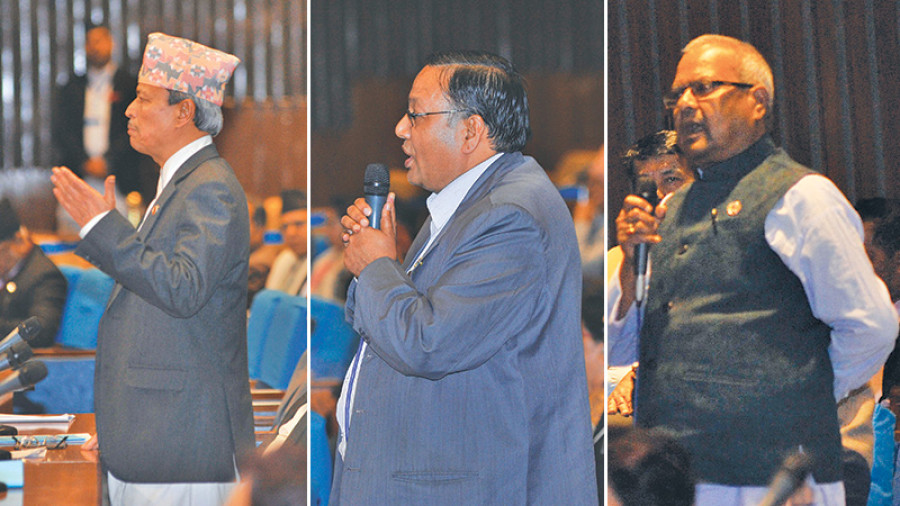Miscellaneous
UML, Maoists, NC slam EU mission’s poll report
Lawmakers from the ruling alliance have condemned the report of the European Union Election Observation Mission, which has recommended denying Khas-Aryas their proportional representation election quota, calling it an attack on the country’s sovereignty.
Lawmakers from the ruling alliance have condemned the report of the European Union Election Observation Mission, which has recommended denying Khas-Aryas their proportional representation election quota, calling it an attack on the country’s sovereignty.
The opposition Nepali Congress condemned the recommendations separately.
In a meeting of the House of Representatives on Monday, the people’s representatives said friendly nations should not undermine the constitution of other countries just because they provided support in need.
In line with the government’s position, they have asked the EUEOM to withdraw its recommendations, warning it not to interfere in the country’s sovereignty in future.
“This sort of interference is unacceptable to a sovereign country,” CPN-UML leader Bhim Rawal told the House meeting, adding that Nepal had set an example for representation of marginalised communities.
Rawal argued that the Constitution of Nepal promulgated by an overwhelming majority of the Constituent Assembly is inclusive and progressive in nature unlike what the EU mission pointed out.
CPN (Maoist Centre) lawmaker Devendra Poudel said foreign meddling in a sovereign country is unacceptable. He argued that the EUEOM should know its limitations while passing recommendations. “The report insults us. The EU Election Observation Mission should review it,” the ruling party leader demanded.
Leaders from the Rastriya Janata Party-Nepal, however, supported the report saying that it was right for the EUEOM to ask the government to correct the weaknesses in the charter.
“The statute needs amendment to end discrimination against Madhesis, Tharus, Muslims and other marginalised communities,” said RJP-N leader Laxman Lal Karna. Lawmakers from the opposition Nepali Congress, who took part in the deliberation, did not comment on the report. They spoke for providing relief to the fire victims in Sunsari.
Outside Parliament, the UML and the opposition NC separately slammed the EU mission’s report as “objectionable”.
In a statement on Monday, the Foreign Affairs Department of the UML said: “In the light of international rules and principles, our party has found that the EUEOM statement blatantly violates” political independence of Nepal, protected by the UN Charter and international laws.
Nepal’s constitution must not be a matter of review for other nations or any entities of them, the UML said. The EU Mission cannot dictate the government of Nepal on the pretext of electoral reforms to alter the constitution promulgated by the sovereign CA, the party said.
The NC also slammed the EUEOM’s report, calling it “highly objectionable”. The ongoing Central Working Committee meeting of the party on Monday discussed the report after CWC member Ramesh Lekhak asked party leaders to come up with a position on the EU’s recommendations.
The report interferes in Nepal’s internal affairs, Lekhak said, calling it “highly objectionable”.
“Serious concern of our party has been drawn to some of the contents of the report, which goes beyond the mission’s jurisdiction,” said NC Spokesperson Bishwa Prakash Sharma. The NC also called on the EUEOM to correct it report, he added.
In the meeting, CWC member Shekhar Koirala strongly objected to the report that “challenges our constitution” and wants to sow the seed of ethnic conflict in Nepal.
Ordinance tabled
KATHMANDU: The ordinance on first amendment to the Enforced Disappearances Inquiry, Truth and Reconciliation Commission Act was tabled in the House of Representatives on Monday. There has been no deliberation on the ordinance tabled by Minister for Law, Justice and Federal Affairs Sher Bahadur Tamang. An ordinance in force has to be presented to the federal parliament within
two months of its first meeting. If approved, its legality continues as Act but is repealed if not endorsed. In the absence of Parliament, the erstwhile Deuba government had issued three ordinances including the one to extend the term of the transitional justice bodies until February 9 next year. (PR)




 9.89°C Kathmandu
9.89°C Kathmandu









